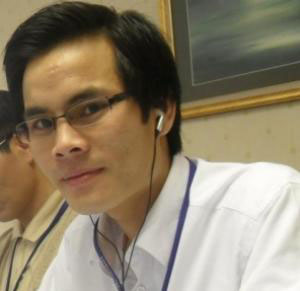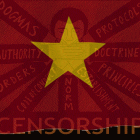23 May 13 | Asia and Pacific
Eight Vietnamese human rights activists are appealing their convictions today.
Index on Censorship has joined a coalition of organisations to pressure the Vietnamese government to end its persecution of the activists. The eight activists, along with six others, were charged under Article 79 of Vietnam’s penal code for “carrying out activities aimed at overthrowing the people’s administration”.
According to Frontline Defenders Ho Duc Hoa was arrested on 30 July 2011 and faces thirteen years in prison followed by five years of house arrest. Thai Van Dung was arrested on 19 August 2011 and faces five years in prison followed by three years house arrest. Paulus Le Son was arrested on 2 August 2011 and faces thirteen years in prison with five years house arrest. Nguyen Xuan Anh is a social activist who faces five years in prison with three years house arrest. Tran Minh Nhat is a journalist with the Vietnam Redemptorist News; he was arrested on 27 August 2011, and was convicted to four years imprisonment with three years house arrest. Ho Van Oanh was arrested on 16 August 2011 and sentenced to three years imprisonment. Nguyen Van Duyet was arrested on 7 August 2011 and was sentenced to six years in prison with four years house arrest. Nguyen Dinh Cuong was sentenced to four years imprisonment.
Today on Index: South Africa’s secrecy bill signals growing political intolerance | Today is Bassel’s second birthday in prison | Free expression in the news
Index on Censorship Events
Caught in the web: how free are we online? June 10, 2013
The internet: free open space, wild wild west, or totalitarian state? However you view the web, in today’s world it is bringing both opportunities and threats for free expression. More >>>
22 Nov 12 | Asia and Pacific, Southeast Asia
On Sunday, the world prepared for President Obama’s first-time visit to the summit of the Association of Southeast Asian Nations (ASEAN). But underneath the press torrent was a lesser-known event: the leaders of the 10 member states of the regional bloc signed the much-lamented ASEAN Human Rights Declaration (AHRD). Freedom of expression, internet privacy, and minority rights are all potential casualties of this document, which amounts to an assortment of titular but pleasant-sounding logorrhea — designed largely by dictators in a region where free expression is, in most countries, on the decline.
The first conundrum? In declaring its broader principles, the charter annuls itself when it states that human rights should be respected everywhere, except that they shouldn’t:
All human rights are universal, indivisible, interdependent and interrelated. All human rights and fundamental freedoms in this Declaration must be treated in a fair and equal manner, on the same footing and with the same emphasis. At the same time, the realisation of human rights must be considered in the regional and national context bearing in mind different political, economic, legal, social, cultural, historical and religious backgrounds.
That’s a huge exception that governments can play with. The US State Department called out concerns of ASEAN’s cultural relativist approach to human rights, a term that labels individual liberties as culturally alien to Asians. It’s a common justification used to curtail expression, made famous when former Prime Minister Lee Kuan Yew of Singapore argued at the end of the Cold War that liberal democracy was a Western value that should not be brought to certain countries.
The declaration also employs the obfuscating language of “national security,” “public order” and “public morality” as prerequisites to exercising basic freedoms. Narrowing that framework down to free speech, the declaration reads, for instance: “Every person has the right to be free from … attacks upon that person’s honour and reputation.” Though not legally binding, those phrases lend legitimacy to the wording that Cambodia, Vietnam, and Thailand typically use when jailing critics.

Mam Sonando, director of Cambodia’s independent Beehive Radio station, who was jailed for 20 years in October
“They can say that we banned such-and-such speech because it goes against our national context, or contravenes a vaguely defined notion such as ‘public morality’ or the ‘general welfare of the peoples in a democratic society’,” said Phil Robertson, deputy director of the Asia Division at Human Rights Watch, “or because those making the speech have their rights balanced by duties to the state to not do such a thing.”
In a region where online surveillance is, in most member states, on the rise, internet privacy gets no mention. The Cambodian Center for Human Rights also pointed out that indigenous and LGBT groups appear to have been left out of specific protections from discrimination and the principle of equality. In Southeast Asia, minorities such as the Rohingya, Wa and Shan in Myanmar, the Papuans in Indonesia, and the potpourri of highland groups often called “Montagnards” in Vietnam have all been persecuted in military and police campaigns, and denied cultural rights.
The triumph of local laws over international concepts of rights should not be surprising from a bloc that is sclerotic and, in the past, has been characterised as a “club of dictators.” ASEAN’s background shows why it straddles this non-interference line on its sovereigns: The organisation was born in 1967 out of the devastation of the Vietnam War, when five countries in Southeast Asia were hoping to tether in an anti-communist grouping that could stand on its own against the involvement of the US, the Soviet Union and China.
But its espousal of “territorial integrity” — of respecting a government’s right to rule without the Cold War-style interference from external powers — quickly became an excuse to back dictators in alliances of convenience. In the late 1970s, ASEAN supported the murderous Khmer Rouge forces at the Thai-Cambodia border, which had already overseen the deaths of 1.7 million people in Cambodia. They hoped the rag-tag army could be a buffer to prevent the powerful Vietnamese military from marching across Thailand — a fear that, in hindsight, was probably not justified, even though Vietnam had invaded Cambodia in 1978.
After the Cold War ended, the group switched its focus from security to trade and expanded its membership to include Cambodia, Burma, Brunei, and nominally communist Vietnam and Laos. But political openness has not accompanied economic growth in Southeast Asia. Rather, the group’s foundational peg of “non-interference” remains unchanged despite signing the 2008 ASEAN Charter, and its delegates continue to defer to national governments on questions of free expression.
With that said, does the human rights declaration even matter on free speech issues? Probably not, given the bloc’s chimera of consensus that, put bluntly, is indifference.
Free speech will come from inside the ASEAN member states themselves, rather than from the bureaucrats who exchange flowers, link their hands together in photo ops and call each other “Your Excellency” at summits.
Geoffrey Cain is an editor at New Mandala, the Southeast Asia blog at the Australian National University
More on Southeast Asia:
Former BBC reporter Bill Hayton on being banned from Vietnam
How Cambodia silences dissent
Webmaster avoids jail in Thai Thai lèse majesté case
15 Nov 12 | Asia and Pacific
Vietnam is a country that bans authors because of what they write. I know this because it has just happened to me. Two months ago the Diplomatic Academy of Vietnam invited me to attend its annual East Sea conference. Today, standing at the airport check-in counter at Heathrow Airport, I finally abandoned my efforts to get there. It’s a huge disappointment — the conference looks excellent and it would have been a chance to properly understand the Vietnamese position on the East Sea disputes. Now the book that I am writing about those disputes will have to go ahead without a Vietnamese perspective. All because of the Vietnamese Ministry of Public Security.
 It’s taken two months of emails and phone calls to get to this point. For the past week the Diplomatic Academy has actively been trying to find a solution, and in the past few days the British Embassy in Hanoi has also been trying to help. Today came the confirmation — my visa has been refused by the Ministry of Public Security (MPS). The Embassy told me as I was waiting by the check-in desk.
It’s taken two months of emails and phone calls to get to this point. For the past week the Diplomatic Academy has actively been trying to find a solution, and in the past few days the British Embassy in Hanoi has also been trying to help. Today came the confirmation — my visa has been refused by the Ministry of Public Security (MPS). The Embassy told me as I was waiting by the check-in desk.
The only reason the MPS can have for banning me is that it doesn’t like the book I published two years ago, Vietnam: Rising Dragon. It can be the only reason — I have no contact with dissident organisations, I have never plotted to overthrow the Party or the state and I have never committed an offence against Vietnam’s immigration laws. Of course, when I was the BBC reporter in Hanoi six years ago, I regularly broke the Press Law — but then every foreign journalist in Vietnam breaks that almost every single day. It’s impossible to be a foreign journalist in Vietnam without contravening the Law’s draconian restrictions.
The Press Law requires all foreign journalists to give the authorities five days notice of every journalistic activity they undertake — every interview, every phone call, every request for information. Of course it is impossible to do this and meet deadlines, so all foreign journalists just break the law and the authorities ignore it — until the foreign journalist writes something that the Ministry of Public Security doesn’t like. It’s one reason why Vietnam sits at the bottom of international lists on media freedom. But they don’t get banned.
So why am I a threat to Public Security? Does the MPS think my book could really destroy the leading role of the Communist Party of Vietnam? It’s a fair, honest and balanced portrayal of modern Vietnam. That means it contains both praise and criticism — honest accounts of how the political system works, how the Party maintains its hold on power and how it relates to the outside world. Little of it is new to most Vietnamese people: they know most of these things very well. I think my offence was to say these things in public – and in English — where foreign governments and aid donors can read them. Vietnam: rising dragon has been well received. At least one American university recommends it to students studying Southeast Asia. No-one has told me about any mistakes or inaccuracies, and no-one has called it biased or unfair.
Perhaps this is the reason why it has not been granted a publication licence in Vietnam. Perhaps this is the reason why I am now banned from the country too. It seems that — for the MPS — it’s an offence to write the honest truth about modern Vietnam.
Bill Hayton is a former BBC reporter in Hanoi and author of Vietnam: Rising Dragon
More on this story:




